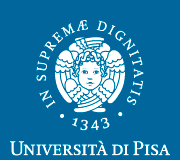
e-mail: irene.sodi@phd.unipi.it
Supervisore tesi: Prof.ssa Federica Salari
Titolo Progetto: Studio della sostenibilità ambientale dell’ovinicoltura in Toscana
Abstract: Il comparto zootecnico, soprattutto a causa dell’allevamento dei ruminanti, è stato identificato come un settore che contribuisce per circa il 75% alle emissioni gassose agricole che a loro volta rappresentano il 15% dei GHG di origine antropica. Si stima che a livello globale i piccoli ruminanti siano responsabili del 7% delle emissioni del comparto zootecnico (596 milioni di tonnellate di CO2 eq). Il contributo degli ovini a queste emissioni è minore rispetto alle altre specie zootecniche (62% bovini, 11% avicoli, 10% bufalini, 10% suini). Tuttavia, poiché gli effetti del cambiamento climatico devono essere limitati, ogni singolo settore produttivo dovrebbe ridurre la propria impronta di carbonio e, più in generale, il suo impatto ambientale. In Italia il settore ovino ha un valore di circa 814 milioni di euro, di cui 630 milioni derivanti dalla produzione di latte. Inoltre, circa il 78% della produzione nazionale complessiva di latte ovino è generato in sole tre regioni a causa della solida concentrazione territoriale delle greggi: Sardegna, Toscana e Lazio. La Toscana si posiziona quindi tra le regioni più rappresentative per il comparto ovino. Lo scopo del progetto è quello di quantificare il potenziale impatto ambientale della produzione di latte ovino in Toscana col metodo Life Cycle Assessment (LCA), individuare i punti più critici e i principali fattori che influenzano le performances ambientali.
Project title: Study of the environmental sustainability of sheep sector in Tuscany
Abstract: Livestock contributes about 75% to agricultural greenhouse gases which represent 15% of anthropogenic GHG, especially due to ruminant species. It is estimated that on a global level, small ruminants are responsible for 7% of emissions from the livestock sector (596 million tons of CO2 eq). The contribution of sheep to these emissions is lower than other livestock species (62% cattle, 11% poultry, 10% buffalo, 10% pigs). However, since the effects of climate change must be limited, every single productive sector must reduce its carbon footprint and, more generally, its environmental impact. In Italy, the sheep production sector has a value of approximately EUR 814 million, of which EUR 630 million derive from milk production. In addition, about 78% of the overall national ovine milk production is generated in only three regions due to the solid territorial concentration of the flocks: Sardinia, Tuscany and Lazio. Tuscany is therefore positioned among the most representative regions for the sheep sector. The aim of the project is to quantify the potential environmental impact of sheep milk production in Tuscany with the Life Cycle Assessment (LCA) method and identify the hotspots and the main factor contributing to the enviromental performances.
ORCID ID: https://orcid.org/0000-0003-4939-6002
Scopus ID: https://www.scopus.com/authid/detail.uri?authorId=58062338300
ARPI: https://arpi.unipi.it/cris/rp/rp184272
Pubblicazioni:
- Effects of bread in the diet of fattening pigs reared extensively. Giuliotti L., Sodi I., Martini M., Mancini S., Preziuso G., Altomonte I. Animal Science Papers and Reports, 2022, vol. 40, no. 4, p:453-462.
- Sterols, tocopherols, and bioactive fatty acids differences between conventional, high quality, and organic cow milk. Journal of Dairy Science, 2023, Volume 106, Issue 12, Pages 8239 – 8248. Martini M., Altomonte I., Sodi I., Vasylieva Y., Salari F.
- Gastrointestinal Parasite Infections and Environmental Sustainability of the Ovine Sector: Eimeria spp. Infections and Nitrogen and Phosphorus Excretions in Dairy Sheep in Italy. Pathogens, 2023, 12, 1459. Sodi I., Martini M., Salari F., Perrucci S.
- Risk categorization in on farm welfare in different sized dairy sheep flocks. Animals, 2024, 7;14(10):1401. Salari F., Roncoroni C., Mariottini F., Muzic A., Altomonte I., Sodi I., Creatini S., Giuliotti L., Brajon G., Martini M.
- Qualitative characteristics of mule milk during lactation, Animals, 2024, 14(11), 1585. Martini M., Degl’Innocenti A., Altomonte I., Sodi I., Bocci C., Fanelli D., Moroni R., Panzani D., Camillo F., Salari F.
- Massese, Sarda and Lacaune dairy sheep breeds: an environmental impact comparison. Sustainability, 2024, 16(12), 4941; https://doi.org/10.3390/su16124941 Sodi I., Martini M., Sanjuàn N., Saia S., Altomonte I., Andreucci A., Fronte B., Pedonese F., Giuliotti L., Ciampolini R., Salari F.
Comunicazioni orali a congresso:
- Study of the environmental sustainability of dairy sheep farming in the Tuscany Region. Sodi I., Martini M., Andreucci A., Ciampolini R., Fronte B., Giuliotti L., Pedonese F., Salari F., XXIV National Congress SIPAOC, 22-23 February 2023, Viterbo, Italy.
- Fatty acids and sterols composition of three commercial cow’s milks, Salari F., Altomonte I., Sodi I., Martini M.25th Congress ASPA, 13-16 June 2023, Monopoli, Bari, Italy, ASPA 25th Congress Book of Abstract, Italian Journal of Animal Science, 22, p:56.
- Alternative diets for IMTA production of gilthead sea bream (Sparus aurata): growth performances and fillets quality, Rossi L., Bibbiani C., Sangiacomo C., Pardossi A., Altomonte I., Sodi I., Fronte B., Aquaculture Europe 2023, 18-21 September 2023, Vienna, Austria, Book of Abstracts p:1247.
- Carbon e Water Footprint del latte ovino pordotto in Toscana: risultati preliminari, Sodi I., Salari F., Sanjuán N., Saia S., Altomonte I., Martini M., 3° edizione del workshop “Life Cycle Thinking applicato al settore agro-alimentare”, 25 Gennaio 2024, Università degli Studi di Milano, Italia.
- Farm efficiency and environmental impact of dairy sheep, Sodi I., Salari F., Sanjuán, Saia S., Altomonte I., Martini M., 14th International Conference on Life Cycle Assessment of Food 2024, 08-11 September 2024, Barcelona, Spain.
Poster a congresso:
- Effects of origin area and type of production on the quality of sheep’s milk, Sodi I., Salari F., Altomonte I., De Cesari A., Martini M., XXIV National Congress SIPAOC, 22-23 February 2023, Viterbo, Italy.
- Qualitative characteristics of mule’s milk during lactation, Martini M., Sodi I., Salari F., Degl’Innocenti A., Fanelli D., Camillo F., 25th Congress ASPA, 13-16 June 2023, Monopoli, Bari, Italy, ASPA 25th Congress Book of Abstract, Italian Journal of Animal Science, 22, p:20.
- Evaluating the on-farm welfare of dairy sheep reared in semi-extensive system, Salari F., Roncoroni C., Mariottini F., Muzic A., Altomonte I., Sodi I., Creatini S., Giuliotti L., Brajon G., Martini M., European Veterinary Congress of Behavioural Medicine and Animal Welfare, 19-21 October 2023, Pisa, Italy, Proceeding of the 5th EVCBMAW, Dog Behavior, Vol. 9 No. 1, Special Issue, pp:79.
- Can dairy sheep breed influence the environmental impact of farm? Sodi I., Martini M., Saia S., Altomonte I., Andreucci A., Fronte B., Pedonese F., Giuliotti L., Ciampolini R., Salari F., The 75th European Association for Animal Production Annual Meeting, 01-05 September 2024, Florence, Italy.
